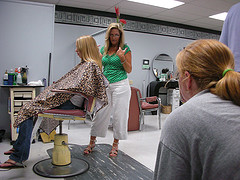Extra practice
Topic 5 deals with three grammar points, which are the final ones in this unit: (1) have / get something done (2) question tags and (3) the vowel sound schwa /ə/. The activities proposed below will help you understand the form and uses of these structures. Pay attention to them and enjoy doing these tasks.
1) We use causative have when arranging for someone to do something for us.
2) The causative have structure implies that we do the things ourselves.
3) The causative have means that we ask somebody else to help us finish a project.
 |
| By Old Shoe Woman. Creative Commons. |
2. Somebody paints my house every year.
3. The hairdresser has cut Paco's hair.
4. We redecorate our house once a year.
5. Antonio likes somebody to wash his car every Sunday.
2) We use questions tags to check if something is true.
3) We don't use questions tags to ask the listener to agree with what we have said.
4) Question tags are placed at the end of the tag question.
5) When the main sentence contains an auxiliary verb, we repeat the auxiliary verb in the question tag.
6) When the main sentence doesn't contain an auxiliary verb, the question tag uses the verb do/does or did.
7) If the subject of the sentence is nothing, everything, something and anything, we use it as the subject in the tag.
 |
| By juliuus mad. GNU license. |
1) You won't come with us to Madrid, __________?
2) Andrés is from Madrid, __________?
3) He has lived in that house for a long time, __________?
4) Your children like pizza a lot, __________?
5) Your sister played basketball before, __________?
6) He wasn't working when I phoned him, __________?
7) You wouldn't like to come to the supermarket with me, __________?
8) She doesn't go to the gym on Sundays, __________?
9) They are from Illinois, __________?
10) The students must study harder, __________?
1) It is the only phoneme with
its own name.
2) It is not a very common vowel sound in English.
3) It is represented by the
upside down e letter.
4) It can only be found in dipthongs.
5) It comes from an Hebrew word which means no vowel sound.
6) It is the most common vowel sound in English.
7) It comes from the Latin language.
8) It may be found in any vowel in English.
1) doctor 2) banana 3)
protect
7) summer 8) level 9)
theatre
 |
| By Howcheng. Public domain. |
Utiliza este enlace para escuchar su pronunciación.